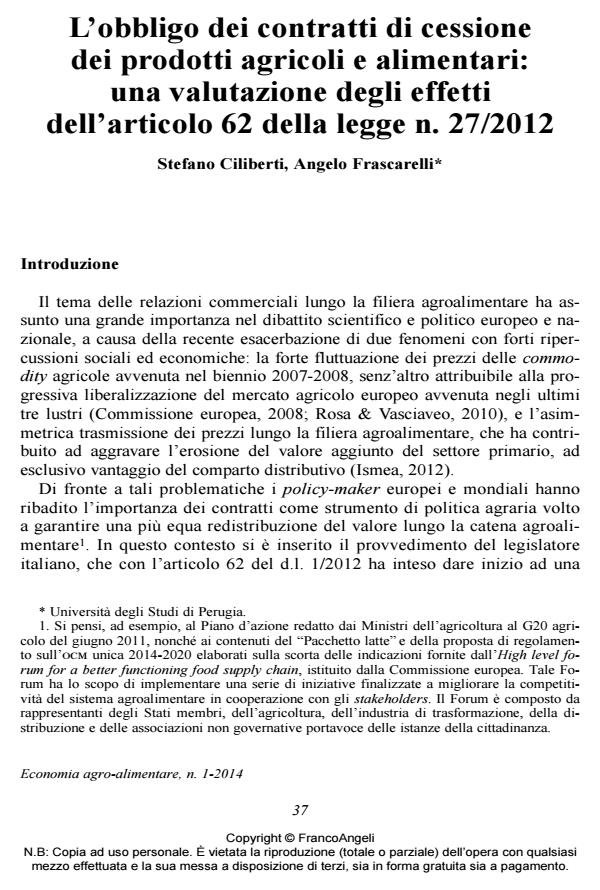L’obbligo dei contratti di cessione dei prodotti agricoli e alimentari: una valutazione degli effetti dell’articolo 62 della legge n. 27/2012
Titolo Rivista ECONOMIA AGRO-ALIMENTARE
Autori/Curatori Stefano Ciliberti, Angelo Frascarelli
Anno di pubblicazione 2014 Fascicolo 2014/1
Lingua Italiano Numero pagine 25 P. 37-61 Dimensione file 175 KB
DOI 10.3280/ECAG2014-001003
Il DOI è il codice a barre della proprietà intellettuale: per saperne di più
clicca qui
Qui sotto puoi vedere in anteprima la prima pagina di questo articolo.
Se questo articolo ti interessa, lo puoi acquistare (e scaricare in formato pdf) seguendo le facili indicazioni per acquistare il download credit. Acquista Download Credits per scaricare questo Articolo in formato PDF

FrancoAngeli è membro della Publishers International Linking Association, Inc (PILA), associazione indipendente e non profit per facilitare (attraverso i servizi tecnologici implementati da CrossRef.org) l’accesso degli studiosi ai contenuti digitali nelle pubblicazioni professionali e scientifiche.
In recent years, European farmers have been facing two new phenomena: agricultural commodity price volatility and a decrease in agricultural added value. These issues led the High Level Forum to censure low transparency in relationships between firms and frequently unfair commercial practices, after the European Commission had recognized that the agri-food supply chains were functioning imperfectly. Economic theory considers contracts as a means of coordinating entrepreneurs’ decisions (e.g. in terms of time, quantity, prices and product quality). Nevertheless, in the presence of oligopsony, buyers use contracts to improve and exercise their market power, for example by imposing vertical restraints. This situation is typical of European food supply chains, where highly concentrated sectors (food industry and retail) use their bargaining power against agriculture. In this context, antitrust authorities and eu Member States have sought to resolve the situation by stipulating appropriate competition policy measures. In Italy, Law 27/2012 has recently introduced new mandatory rules regarding sales contracts for agriculture and food products, in order to increase trading transparency and reduce payment times. Using an embedded multiple-case study, carried out through interviews and direct observations, this article analyses the initial effects of the application of the law on the Italian agri-food system.
Parole chiave:Contracts, market power, antitrust, agri-food system, Italy
Jel codes:Q13, Q18, L14
- It's a jungle out there - the strange animals of economic organization in agri-food value chains S. Ciliberti, A. Frascarelli, pp.283 (ISBN:9789086868445)
- The Effects of Agricultural Price Instability on Vertical Price Transmission: A Study of the Wheat Chain in Italy Elena Claire Ricci, Massimo Peri, Lucia Baldi, in Agriculture /2019 pp.36
DOI: 10.3390/agriculture9020036
Stefano Ciliberti, Angelo Frascarelli, L’obbligo dei contratti di cessione dei prodotti agricoli e alimentari: una valutazione degli effetti dell’articolo 62 della legge n. 27/2012 in "ECONOMIA AGRO-ALIMENTARE" 1/2014, pp 37-61, DOI: 10.3280/ECAG2014-001003